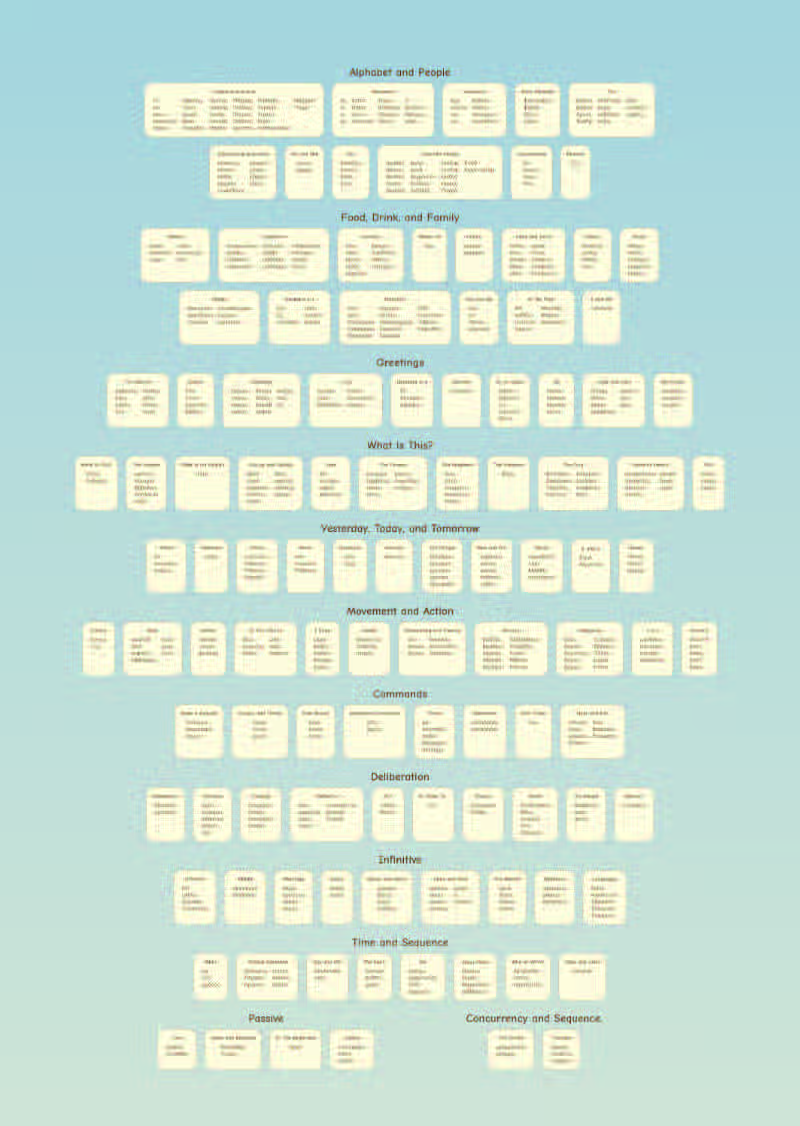Scripturial Vocabulary
When studying a language, there are two primary ways of organising and ordering vocabulary: by word frequency, and by topic. This article shares how the core vocabulary for Scripturial was chosen.

Download the Scripturial Vocabulary Chart.
By Word Frequency
The first option is to find and memorise the most frequently occuring words in a language. After you have learnt a few hundred frequent words, you may be able to recognise 50, 60, or perhaps 70% of the words in some sentences. It is logical to make an effort to learn these most frequent words. You can then continue on and memorise the next few hundred most frequent words, and perhaps be able to read 60, 70, or sometimes 80% of words in a sentence. The problem with this approach in the long term, is that you increase the number of words you can read in a sentence, but you can never actually read an entire sentence without a dictionary. This forces the learner into a situation that they must use a dictionary to actually read real sentences. Personally, I would encourage everyone to learn at least the first few hundred most frequent words, but don't get stuck on this path forever.
By Topic
The second option is to group vocabulary by topic or simple reading material. For example, if you learn all the basic vocabulary related to a school classroom, it is then possible to very quickly start practicing reading, listening, writing, and speaking complete sentences without dependence on a dictionary. Learners may find this approach much more enjoyable because it very quickly enables us to start using the language productively, talk to one another in a classroom setting, act out scenarious related to the classrom, and even play simple games.
A Balanced Approach
Scripturial App aims to find a balance between both of these options. The primary aim is to group vocabulary by topic so that we can begin practicing complete and meaningful sentences without the need to walk around with a dictionary in our hands. Secondly, key themes and passages found in the Greek New Testament remain a top priority. For example, the vocabulary related to farming, vineyards, and grapevines is grouped together in a specially themed activity with the goal of enabling a smooth transition into reading the start of John 15.
This means in some cases, some low frequency vocabulary has been carefully selected for inclusion. The word commonly translated as 'apple' (μῆλον) is a rare word, but apples are readily available to many teachers and students, and can easily be used as props in a classroom setting. Apples can be placed on, under, or inside things, they can be passed around, thrown. Apples can be red or green, and they can even be eaten. Furthermore, 'apple' can then be also used to create short easy to read sentences and stories on the theme of Adam and Eve in the garden.
Colours and numbers are also relativly rare in the Greek New Testament, but if we take some time to learn colours and numbers, it rapidly expands the number and variety of practice sentences that can be read, spoken, or used in class as part of an activity. (Give me the red book. Who has the green book? etc...)
When you use scripturial, you will notice that the flashcards for a word do not become available until a lesson has been completed that demonstrates how this word is used in real sentences. The intention is that words should be learnt in the context of real, understandable, comprihensible sentences. Flascard are considered a helpful memory aide, to remind us of words we have already practiced in real sentences.
In Scripturial, each flashcard for a word does not become available until its practice activity has been completed. This ensures that words are first learnt in the context of real, understandable, comprihensible sentences. Flashcards are demoted to being a helpful memory aide, to remind us of words we have already practiced in real sentences.
Vocabulary Chart
The Scripturial vocabulary list can be downloaded, printed, hang on a wall, and even used as a reference for creating your own short sentences and stories. If there are any helpful or useful words that you think are key words for people wanting to practice Biblical Greek in a classroom setting, please let me know. I would like the app to be helpful for as many people as possible.